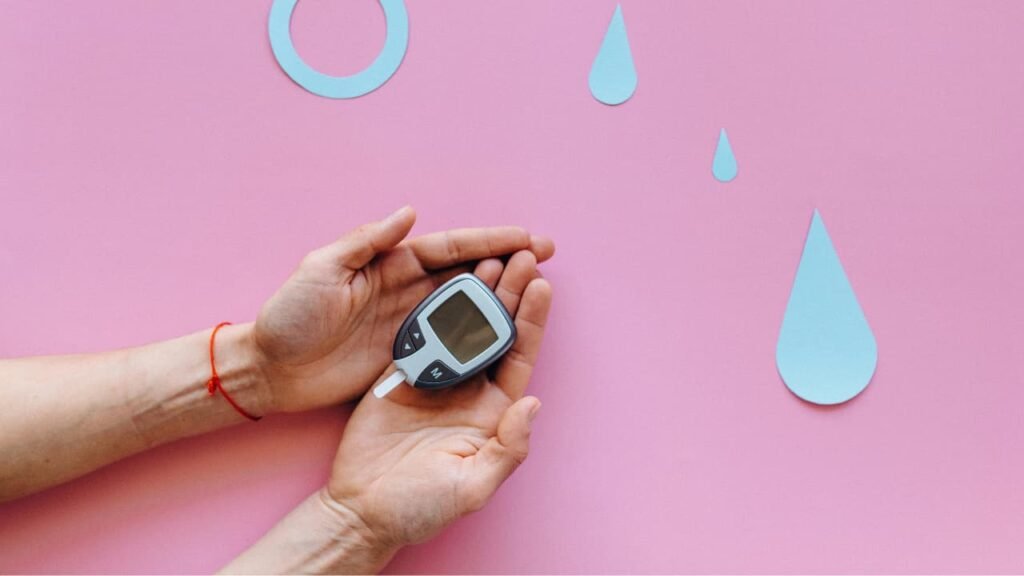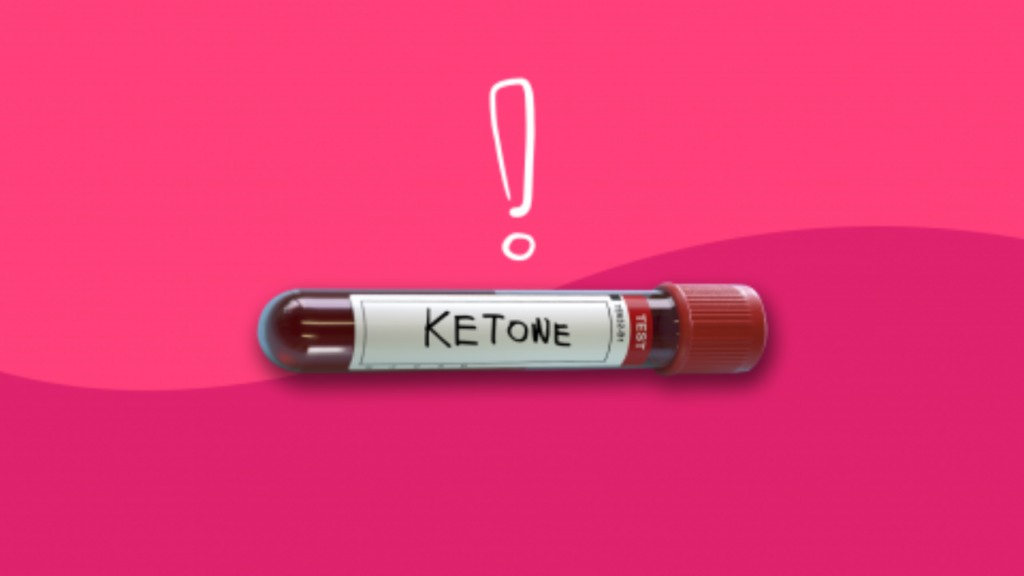Table of Contents
ToggleDid you know the best blood ketone levels for losing weight are between 0.5 and 3 millimoles per liter (mmol/L)? This range puts your body into nutritional ketosis. Here, it uses fat as its main fuel instead of carbs. Keeping these levels right is key for those on a low-carb, high-fat diet.
Key Takeaways
- The optimal blood ketone range for weight loss is 0.5 – 3 mmol/L.
- Entering ketosis requires dramatically reducing carb intake, typically to less than 50 grams of total carbs or 25 grams of net carbs per day.
- Being in ketosis can help improve blood sugar levels, reduce appetite, and maintain muscle mass, contributing to weight loss.
- Monitoring your blood ketone levels is crucial to ensure you’re in the optimal range for your goals.
- Tools like the Keto-Mojo app can help you conveniently track and manage your ketone levels.
Knowing your blood ketone levels and keeping them in the right range is key for a ketogenic diet’s benefits. We’ll explore more about the best ketone levels, how to get and keep them, and why measuring and tracking them accurately matters.
What are Optimal Blood Ketone Levels?

Reaching the right blood ketone levels is key for using stored fat for energy and losing weight. The best range for nutritional ketosis is between 0.5 and 3 millimoles per liter (mmol/L) of blood ketones.
The Ideal Ketone Range for Weight Loss
The best ketone levels for losing weight are usually between 1.5 and 3 mmol/L. At this level, the body uses fat as its main energy source. This leads to better fat burning and weight control.
It’s crucial to know that nutritional ketosis is different from diabetic ketoacidosis (DKA). DKA has ketone levels over 3 mmol/L and is a serious diabetes complication. It needs quick medical help.
| Ketone Level | Interpretation |
|---|---|
| Under 0.6 mmol/L | Normal |
| 0.6 to 1.5 mmol/L | Slightly high |
| 1.6 to 3 mmol/L | Ideal for weight loss (nutritional ketosis) |
| Over 3 mmol/L | High, potential risk of diabetic ketoacidosis |
Keeping ketone levels in the right range can be done with a low-carb, high-fat diet and fasting. This approach helps with weight loss and health benefits of nutritional ketosis.
How to Achieve Optimal Ketone Levels
Getting your ketone levels right is crucial for the benefits of a low-carb diet and ketosis. To enter ketosis, cut your carb intake to less than 50 grams a day. This means no more than 25 grams of net carbs.
This low carb diet makes your body use fat for energy. You can also boost your ketones with ketone supplements, or exogenous ketones. But, how these supplements affect weight loss is still being studied.
Here are some tips to help you achieve and keep up with ketone levels:
- Limit your carb intake to 20-50 grams per day.
- Boost your healthy fats with foods like avocados, olive oil, nuts, and fatty fish.
- Try intermittent fasting to deepen ketosis.
- Do regular aerobic exercise to increase ketone production.
- Use blood, urine, or breath tests to check your ketone levels.
Reaching and keeping ketone levels right takes effort and commitment. But, the benefits of a ketogenic diet, like losing weight, feeling more energetic, and improving health, are worth it for many.
| Ketone Level Range | Description |
|---|---|
| 0.5 mmol/L – 3.0 mmol/L | Nutritional ketosis, the ideal range for most keto goals |
| 3.0 mmol/L – 7.0 mmol/L | Medically therapeutic ketosis, often seen in conditions like epilepsy |
| Above 7.0 mmol/L | Potentially dangerous ketoacidosis, a concern for individuals with diabetes |
“For most Keto goals, maintaining nutritional ketosis between 0.5 mmol/L-3.0 mmol/L is recommended.”
Measuring Your Blood Ketone Levels
It’s key to track your ketone levels well to make the most of your ketogenic diet and avoid health issues. The best way to do this is with a blood ketone meter. These devices give you a direct reading of your ketone levels, just like a blood sugar meter.
Ketone urine strips and breath testing devices are easier to get but not as precise as blood tests. Urine strips show your ketone levels from before, not now. Breath tests measure acetone, which might not match your actual ketone levels.
Test your blood ketones about 3 hours after eating for the most accurate results. But, you don’t need to check your ketone levels all the time to succeed on the keto diet. Many people see their ketone levels go up as they get used to eating fewer carbs.
“Checking your ketone levels is not necessary to be successful on the keto diet.”
Deciding how often to test your ketone levels should depend on what you want and like. Knowing about the different testing methods and their benefits helps you choose what’s best for your keto path.
Conditions Associated with High Ketone Levels

High ketone levels can be good for weight loss and health, but they can also be risky. Two serious conditions that can happen are diabetic ketoacidosis (DKA) and alcoholic ketoacidosis (AKA).
Diabetic Ketoacidosis (DKA)
DKA is a serious condition that can happen to people with diabetes, especially those with type 1 diabetes. It’s caused by very high blood sugar and ketone levels, which can happen quickly. Symptoms include feeling very thirsty, needing to pee a lot, feeling sick to your stomach, vomiting, and stomach pain.
If not treated, DKA can cause you to lose consciousness and even be deadly. People with diabetes should watch their blood sugar and ketone levels, especially when they’re sick or stressed. If your blood sugar is over 300 mg/dL (16.7 mmol/L) or your ketones are high, get emergency help. DKA is treated with fluids, electrolytes, and insulin through a vein.
Alcoholic Ketoacidosis (AKA)
Alcoholic ketoacidosis is another serious condition linked to high ketone levels. It usually happens in people who drink a lot of alcohol over a long time. When your body can’t get enough glucose, it starts to break down fat for energy, making your ketone levels go up.
Symptoms of AKA include feeling sick, vomiting, stomach pain, and being confused. AKA is an emergency that needs quick treatment with fluids, electrolytes, and help to stop drinking alcohol. If not treated, it can lead to serious health problems.
It’s key to live a healthy life and manage your diabetes or alcohol use to avoid these risks. Talk to your doctor if you’re worried about your ketone levels or think you might have DKA or AKA.
Blood Ketone Levels and Exercise

Exercise and blood ketone levels have a complex relationship. The effects can differ from one person to another. The type of exercise you do greatly affects your ketone levels.
Anaerobic Exercise and Ketone Levels
Anaerobic exercises like weight lifting or sprinting can lower your ketone levels. They also raise your blood glucose. These activities are high intensity and short, using more glucose for fuel.
Aerobic Exercise and Ketone Levels
Aerobic exercises, such as swimming, cycling, or jogging, can boost your ketone levels. These activities are lower in intensity but longer in duration. They use up glucose, making your body burn fat and produce ketones for energy.
Checking your blood ketone levels shows how your body reacts to different exercises. This info helps you adjust your diet and workouts. It ensures you stay in optimal ketosis for your goals, like losing weight, improving athletic performance, or boosting health.
“The contribution of exogenous βHB oxidation to energy expenditure peaked during the 25% WMax exercise intensity but was relatively low at 4.46% ± 2.71%.”
Understanding how exercise affects ketone levels helps you fine-tune your training and diet. This way, you can reach your goals more effectively.
Conclusion
Keeping optimal blood ketone levels for nutritional ketosis and weight loss in the 0.5 – 3 mmol/L range is key for those on a ketogenic diet. Testing isn’t a must for success, but it helps you see how you’re doing. It lets you tweak your diet and exercise plans as needed.
Checking your blood ketone levels often can show you the best ways to stay in nutritional ketosis. This supports your weight loss efforts. Knowing how ketones work and their effects helps you make smart choices for your diet and health.
It’s wise to talk to health experts, like those who focus on diabetes care, before starting a ketogenic diet. They can offer advice and help you handle any issues with your ketone levels. With the right advice and effort, you can enjoy ketosis’s benefits while avoiding its risks.
FAQ
What is the optimal ketone range for weight loss?
The best ketone level for losing weight is 0.5 – 3 millimoles per liter (mmol/L). To get here, you need to cut down on carbs a lot. This lets your body use fat as its main energy source.
What is the ideal blood ketone range for nutritional ketosis?
For nutritional ketosis, the best blood ketone level is 0.5 – 3 millimoles per liter (mmol/L). This range helps you use stored fat for energy and aids in losing weight and fat.
How can I achieve optimal ketone levels?
To get the best ketone levels, cut your carb intake way down. Aim for less than 50 grams of total carbs or 25 grams of net carbs daily. This makes your body use fat for ketones. You can also use ketone supplements, but their effect on weight loss isn’t clear.
How can I measure my blood ketone levels?
The best way to check your ketone levels is with a blood ketone meter, like a blood sugar meter. You can also use urine test strips or breath devices, but they’re not as precise. Test 3 hours after eating for the most accurate results.
What are the conditions associated with high ketone levels?
High ketone levels can signal serious health issues, like diabetic ketoacidosis (DKA) and alcoholic ketoacidosis. DKA is a diabetes complication with very high ketones and glucose, needing quick medical help. Alcoholic ketoacidosis happens in heavy drinkers and is also an emergency.
How does exercise affect my blood ketone levels?
Exercise changes your blood ketone levels, but how much depends on you. Anaerobic exercises like weight lifting or sprinting might lower ketones and raise blood sugar. On the other hand, aerobic activities like swimming or biking can boost ketone levels.





